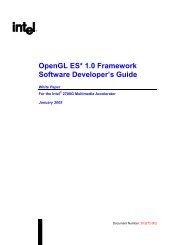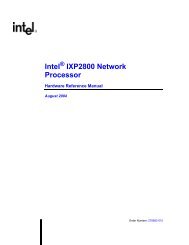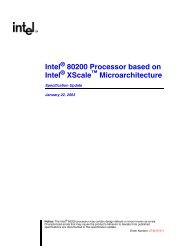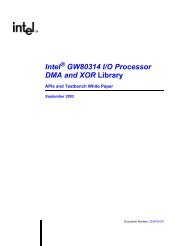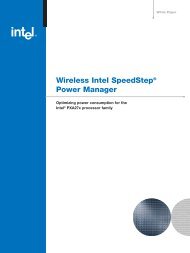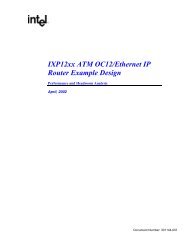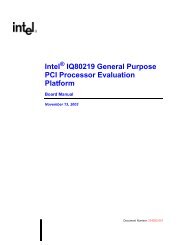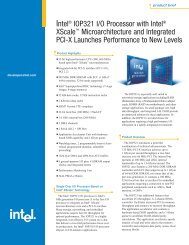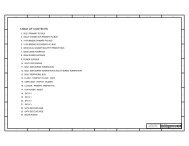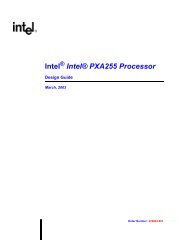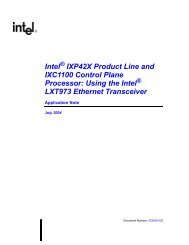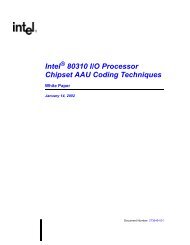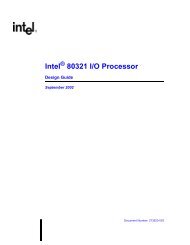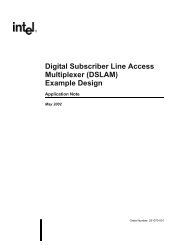- Page 1 and 2:
Intel ® 80312 I/O Companion ChipDe
- Page 3 and 4:
Intel ® 80312 I/O Companion ChipCo
- Page 5 and 6:
Intel ® 80312 I/O Companion Chip3.
- Page 7 and 8:
Intel ® 80312 I/O Companion Chip4.
- Page 9 and 10: Intel ® 80312 I/O Companion Chip5.
- Page 11 and 12: Intel ® 80312 I/O Companion Chip7.
- Page 13 and 14: Intel ® 80312 I/O Companion Chip10
- Page 16 and 17: Intel ® 80312 I/O Companion Chip12
- Page 18 and 19: Intel ® 80312 I/O Companion ChipFi
- Page 20 and 21: Intel ® 80312 I/O Companion Chip12
- Page 22 and 23: Intel ® 80312 I/O Companion Chip4-
- Page 24 and 25: Intel ® 80312 I/O Companion Chip5-
- Page 26 and 27: Intel ® 80312 I/O Companion Chip11
- Page 28 and 29: Intel ® 80312 I/O Companion ChipIn
- Page 30 and 31: Intel ® 80312 I/O Companion ChipIn
- Page 32 and 33: Intel ® 80312 I/O Companion ChipIn
- Page 35 and 36: PCI and Peripheral Interrupt Contro
- Page 37 and 38: Intel ® 80312 I/O Companion ChipPC
- Page 39 and 40: Intel ® 80312 I/O Companion ChipPC
- Page 41 and 42: Intel ® 80312 I/O Companion ChipPC
- Page 43 and 44: Intel ® 80312 I/O Companion ChipPC
- Page 45 and 46: Intel ® 80312 I/O Companion ChipPC
- Page 47 and 48: Intel ® 80312 I/O Companion ChipPC
- Page 49 and 50: Intel ® 80312 I/O Companion ChipPC
- Page 51 and 52: Memory Controller 3This chapter des
- Page 53 and 54: Intel ® 80312 I/O Companion ChipMe
- Page 55 and 56: Intel ® 80312 I/O Companion ChipMe
- Page 57 and 58: Intel ® 80312 I/O Companion ChipMe
- Page 59: Intel ® 80312 I/O Companion ChipMe
- Page 63 and 64: Intel ® 80312 I/O Companion ChipMe
- Page 65 and 66: Intel ® 80312 I/O Companion ChipMe
- Page 67 and 68: Intel ® 80312 I/O Companion ChipMe
- Page 69 and 70: Intel ® 80312 I/O Companion ChipMe
- Page 71 and 72: Intel ® 80312 I/O Companion ChipMe
- Page 73 and 74: Intel ® 80312 I/O Companion ChipMe
- Page 75 and 76: Intel ® 80312 I/O Companion ChipMe
- Page 77 and 78: Intel ® 80312 I/O Companion ChipMe
- Page 79 and 80: Intel ® 80312 I/O Companion ChipMe
- Page 81 and 82: Intel ® 80312 I/O Companion ChipMe
- Page 83 and 84: Intel ® 80312 I/O Companion ChipMe
- Page 85 and 86: Intel ® 80312 I/O Companion ChipMe
- Page 87 and 88: Intel ® 80312 I/O Companion ChipMe
- Page 89 and 90: Intel ® 80312 I/O Companion ChipMe
- Page 91 and 92: Intel ® 80312 I/O Companion ChipMe
- Page 93 and 94: Intel ® 80312 I/O Companion ChipMe
- Page 95 and 96: Intel ® 80312 I/O Companion ChipMe
- Page 97 and 98: Intel ® 80312 I/O Companion ChipMe
- Page 99 and 100: Intel ® 80312 I/O Companion ChipMe
- Page 101 and 102: Intel ® 80312 I/O Companion ChipMe
- Page 103 and 104: Intel ® 80312 I/O Companion ChipMe
- Page 105 and 106: Intel ® 80312 I/O Companion ChipMe
- Page 107 and 108: Intel ® 80312 I/O Companion ChipMe
- Page 109 and 110: Intel ® 80312 I/O Companion ChipMe
- Page 111:
Intel ® 80312 I/O Companion ChipMe
- Page 114 and 115:
Intel ® 80312 I/O Companion ChipPC
- Page 116 and 117:
Intel ® 80312 I/O Companion ChipPC
- Page 118 and 119:
Intel ® 80312 I/O Companion ChipPC
- Page 120 and 121:
Intel ® 80312 I/O Companion ChipPC
- Page 122 and 123:
Intel ® 80312 I/O Companion ChipPC
- Page 124 and 125:
Intel ® 80312 I/O Companion ChipPC
- Page 126 and 127:
Intel ® 80312 I/O Companion ChipPC
- Page 128 and 129:
Intel ® 80312 I/O Companion ChipPC
- Page 130 and 131:
Intel ® 80312 I/O Companion ChipPC
- Page 132 and 133:
Intel ® 80312 I/O Companion ChipPC
- Page 134 and 135:
Intel ® 80312 I/O Companion ChipPC
- Page 136 and 137:
Intel ® 80312 I/O Companion ChipPC
- Page 138 and 139:
Intel ® 80312 I/O Companion ChipPC
- Page 140 and 141:
.Intel ® 80312 I/O Companion ChipP
- Page 142 and 143:
Intel ® 80312 I/O Companion ChipPC
- Page 144 and 145:
Intel ® 80312 I/O Companion ChipPC
- Page 146 and 147:
Intel ® 80312 I/O Companion ChipPC
- Page 148 and 149:
Intel ® 80312 I/O Companion ChipPC
- Page 150 and 151:
Intel ® 80312 I/O Companion ChipPC
- Page 152 and 153:
Intel ® 80312 I/O Companion ChipPC
- Page 154 and 155:
Intel ® 80312 I/O Companion ChipPC
- Page 156 and 157:
Intel ® 80312 I/O Companion ChipPC
- Page 158 and 159:
Intel ® 80312 I/O Companion ChipPC
- Page 160 and 161:
Intel ® 80312 I/O Companion ChipPC
- Page 162 and 163:
Intel ® 80312 I/O Companion ChipPC
- Page 164 and 165:
Intel ® 80312 I/O Companion ChipPC
- Page 166 and 167:
Intel ® 80312 I/O Companion ChipPC
- Page 168 and 169:
Intel ® 80312 I/O Companion ChipPC
- Page 170 and 171:
Intel ® 80312 I/O Companion ChipPC
- Page 172 and 173:
Intel ® 80312 I/O Companion ChipPC
- Page 174 and 175:
Intel ® 80312 I/O Companion ChipPC
- Page 176 and 177:
Intel ® 80312 I/O Companion ChipPC
- Page 178 and 179:
Intel ® 80312 I/O Companion ChipPC
- Page 180 and 181:
Intel ® 80312 I/O Companion ChipPC
- Page 182 and 183:
Intel ® 80312 I/O Companion ChipPC
- Page 184 and 185:
Intel ® 80312 I/O Companion ChipPC
- Page 186 and 187:
Intel ® 80312 I/O Companion ChipPC
- Page 188 and 189:
Intel ® 80312 I/O Companion ChipPC
- Page 190 and 191:
Intel ® 80312 I/O Companion ChipPC
- Page 192 and 193:
Intel ® 80312 I/O Companion ChipPC
- Page 194 and 195:
Intel ® 80312 I/O Companion ChipPC
- Page 196 and 197:
Intel ® 80312 I/O Companion ChipPC
- Page 198 and 199:
Intel ® 80312 I/O Companion ChipPC
- Page 200 and 201:
Intel ® 80312 I/O Companion ChipPC
- Page 202 and 203:
Intel ® 80312 I/O Companion ChipPC
- Page 204 and 205:
Intel ® 80312 I/O Companion ChipPC
- Page 206 and 207:
Intel ® 80312 I/O Companion ChipPC
- Page 208 and 209:
Intel ® 80312 I/O Companion ChipPC
- Page 210 and 211:
Intel ® 80312 I/O Companion ChipPC
- Page 212 and 213:
Intel ® 80312 I/O Companion ChipPC
- Page 214 and 215:
Intel ® 80312 I/O Companion ChipPC
- Page 216 and 217:
Intel ® 80312 I/O Companion ChipPC
- Page 218 and 219:
Intel ® 80312 I/O Companion ChipPC
- Page 220 and 221:
Intel ® 80312 I/O Companion ChipPC
- Page 222 and 223:
Intel ® 80312 I/O Companion ChipPC
- Page 224 and 225:
Intel ® 80312 I/O Companion ChipPC
- Page 226 and 227:
Intel ® 80312 I/O Companion ChipPC
- Page 228 and 229:
Intel ® 80312 I/O Companion ChipPC
- Page 230 and 231:
Intel ® 80312 I/O Companion ChipPC
- Page 232 and 233:
Intel ® 80312 I/O Companion ChipPC
- Page 234 and 235:
Intel ® 80312 I/O Companion ChipPC
- Page 236 and 237:
Intel ® 80312 I/O Companion ChipPC
- Page 238 and 239:
Intel ® 80312 I/O Companion ChipPC
- Page 240 and 241:
Intel ® 80312 I/O Companion ChipPC
- Page 242 and 243:
Intel ® 80312 I/O Companion ChipPC
- Page 244 and 245:
Intel ® 80312 I/O Companion ChipPC
- Page 246 and 247:
Intel ® 80312 I/O Companion ChipPC
- Page 248 and 249:
Intel ® 80312 I/O Companion ChipPC
- Page 250 and 251:
Intel ® 80312 I/O Companion ChipPC
- Page 252 and 253:
Intel ® 80312 I/O Companion ChipPC
- Page 254 and 255:
Intel ® 80312 I/O Companion ChipPC
- Page 256 and 257:
Intel ® 80312 I/O Companion ChipPC
- Page 258 and 259:
Intel ® 80312 I/O Companion ChipPC
- Page 260 and 261:
Intel ® 80312 I/O Companion ChipPC
- Page 262 and 263:
Intel ® 80312 I/O Companion ChipPC
- Page 264 and 265:
Intel ® 80312 I/O Companion ChipPC
- Page 266 and 267:
Intel ® 80312 I/O Companion ChipPC
- Page 268 and 269:
Intel ® 80312 I/O Companion ChipPC
- Page 270 and 271:
Intel ® 80312 I/O Companion ChipPC
- Page 272 and 273:
Intel ® 80312 I/O Companion ChipPC
- Page 274 and 275:
Intel ® 80312 I/O Companion ChipPC
- Page 276 and 277:
Intel ® 80312 I/O Companion ChipPC
- Page 278 and 279:
Intel ® 80312 I/O Companion ChipPC
- Page 280 and 281:
Intel ® 80312 I/O Companion ChipPC
- Page 282 and 283:
Intel ® 80312 I/O Companion ChipPC
- Page 284 and 285:
Intel ® 80312 I/O Companion ChipPC
- Page 286 and 287:
Intel ® 80312 I/O Companion ChipPC
- Page 288 and 289:
Intel ® 80312 I/O Companion ChipPC
- Page 290 and 291:
Intel ® 80312 I/O Companion ChipPC
- Page 292 and 293:
Intel ® 80312 I/O Companion ChipPC
- Page 294 and 295:
Intel ® 80312 I/O Companion ChipPC
- Page 296 and 297:
.Intel ® 80312 I/O Companion ChipP
- Page 298 and 299:
Intel ® 80312 I/O Companion ChipPC
- Page 300 and 301:
Intel ® 80312 I/O Companion ChipPC
- Page 302 and 303:
Intel ® 80312 I/O Companion ChipPC
- Page 304 and 305:
Intel ® 80312 I/O Companion ChipPC
- Page 306 and 307:
Intel ® 80312 I/O Companion ChipPC
- Page 308 and 309:
Intel ® 80312 I/O Companion ChipPC
- Page 310 and 311:
Intel ® 80312 I/O Companion ChipPC
- Page 312 and 313:
Intel ® 80312 I/O Companion ChipPC
- Page 314 and 315:
Intel ® 80312 I/O Companion ChipPC
- Page 316 and 317:
Intel ® 80312 I/O Companion ChipPC
- Page 318 and 319:
Intel ® 80312 I/O Companion ChipPC
- Page 320 and 321:
Intel ® 80312 I/O Companion ChipPC
- Page 322 and 323:
Intel ® 80312 I/O Companion ChipPC
- Page 324 and 325:
Intel ® 80312 I/O Companion ChipPC
- Page 326 and 327:
Intel ® 80312 I/O Companion ChipPC
- Page 328 and 329:
Intel ® 80312 I/O Companion ChipPC
- Page 330 and 331:
Intel ® 80312 I/O Companion ChipPC
- Page 332 and 333:
Intel ® 80312 I/O Companion ChipPC
- Page 334 and 335:
Intel ® 80312 I/O Companion ChipPC
- Page 336 and 337:
Intel ® 80312 I/O Companion ChipPC
- Page 338 and 339:
Intel ® 80312 I/O Companion ChipPC
- Page 340 and 341:
Intel ® 80312 I/O Companion ChipPC
- Page 342 and 343:
Intel ® 80312 I/O Companion ChipPC
- Page 344 and 345:
Intel ® 80312 I/O Companion ChipPC
- Page 346 and 347:
Intel ® 80312 I/O Companion ChipPC
- Page 348 and 349:
Intel ® 80312 I/O Companion ChipPC
- Page 350 and 351:
Intel ® 80312 I/O Companion ChipPC
- Page 352 and 353:
Intel ® 80312 I/O Companion ChipPC
- Page 354 and 355:
Intel ® 80312 I/O Companion ChipPC
- Page 357 and 358:
Messaging Unit 6This chapter descri
- Page 359 and 360:
Intel ® 80312 I/O Companion ChipMe
- Page 361 and 362:
Intel ® 80312 I/O Companion ChipMe
- Page 363 and 364:
Intel ® 80312 I/O Companion ChipMe
- Page 365 and 366:
Intel ® 80312 I/O Companion ChipMe
- Page 367 and 368:
Intel ® 80312 I/O Companion ChipMe
- Page 369 and 370:
Intel ® 80312 I/O Companion ChipMe
- Page 371 and 372:
Intel ® 80312 I/O Companion ChipMe
- Page 373 and 374:
Intel ® 80312 I/O Companion ChipMe
- Page 375 and 376:
Intel ® 80312 I/O Companion ChipMe
- Page 377 and 378:
Intel ® 80312 I/O Companion ChipMe
- Page 379 and 380:
Intel ® 80312 I/O Companion ChipMe
- Page 381 and 382:
Intel ® 80312 I/O Companion ChipMe
- Page 383 and 384:
Intel ® 80312 I/O Companion ChipMe
- Page 385 and 386:
Intel ® 80312 I/O Companion ChipMe
- Page 387 and 388:
Intel ® 80312 I/O Companion ChipMe
- Page 389 and 390:
Intel ® 80312 I/O Companion ChipMe
- Page 391 and 392:
Intel ® 80312 I/O Companion ChipMe
- Page 393 and 394:
Intel ® 80312 I/O Companion ChipAr
- Page 395 and 396:
Intel ® 80312 I/O Companion ChipIn
- Page 397 and 398:
Intel ® 80312 I/O Companion ChipIn
- Page 399 and 400:
Intel ® 80312 I/O Companion ChipIn
- Page 401 and 402:
Intel ® 80312 I/O Companion ChipIn
- Page 403 and 404:
Intel ® 80312 I/O Companion ChipIn
- Page 405 and 406:
Intel ® 80312 I/O Companion ChipIn
- Page 407 and 408:
Intel ® 80312 I/O Companion ChipIn
- Page 409 and 410:
Intel ® 80200 Processor based on I
- Page 411 and 412:
Intel ® 80312 I/O Companion ChipIn
- Page 413 and 414:
Intel ® 80312 I/O Companion ChipIn
- Page 415 and 416:
Intel ® 80312 I/O Companion ChipIn
- Page 417 and 418:
Intel ® 80312 I/O Companion ChipIn
- Page 419 and 420:
Intel ® 80312 I/O Companion ChipIn
- Page 421 and 422:
Intel ® 80312 I/O Companion ChipIn
- Page 423 and 424:
DMA Controller Unit 9This chapter d
- Page 425 and 426:
Intel ® 80312 I/O Companion ChipDM
- Page 427 and 428:
Intel ® 80312 I/O Companion ChipDM
- Page 429 and 430:
Intel ® 80312 I/O Companion ChipDM
- Page 431 and 432:
Intel ® 80312 I/O Companion ChipDM
- Page 433 and 434:
Intel ® 80312 I/O Companion ChipDM
- Page 435 and 436:
Intel ® 80312 I/O Companion ChipDM
- Page 437 and 438:
Intel ® 80312 I/O Companion ChipDM
- Page 439 and 440:
Intel ® 80312 I/O Companion ChipDM
- Page 441 and 442:
Intel ® 80312 I/O Companion ChipDM
- Page 443 and 444:
Intel ® 80312 I/O Companion ChipDM
- Page 445 and 446:
Intel ® 80312 I/O Companion ChipDM
- Page 447 and 448:
Intel ® 80312 I/O Companion ChipDM
- Page 449 and 450:
Intel ® 80312 I/O Companion ChipDM
- Page 451 and 452:
Intel ® 80312 I/O Companion ChipDM
- Page 453 and 454:
Intel ® 80312 I/O Companion ChipDM
- Page 455 and 456:
Intel ® 80312 I/O Companion ChipDM
- Page 457 and 458:
Intel ® 80312 I/O Companion ChipDM
- Page 459 and 460:
Application Accelerator Unit 10This
- Page 461 and 462:
Intel ® 80312 I/O Companion ChipAp
- Page 463 and 464:
Intel ® 80312 I/O Companion ChipAp
- Page 465 and 466:
Intel ® 80312 I/O Companion ChipAp
- Page 467 and 468:
Intel ® 80312 I/O Companion ChipAp
- Page 469 and 470:
Intel ® 80312 I/O Companion ChipAp
- Page 471 and 472:
Intel ® 80312 I/O Companion ChipAp
- Page 473 and 474:
Intel ® 80312 I/O Companion ChipAp
- Page 475 and 476:
Intel ® 80312 I/O Companion ChipAp
- Page 477 and 478:
Intel ® 80312 I/O Companion ChipAp
- Page 479 and 480:
Intel ® 80312 I/O Companion ChipAp
- Page 481 and 482:
Intel ® 80312 I/O Companion ChipAp
- Page 483 and 484:
Intel ® 80312 I/O Companion ChipAp
- Page 485 and 486:
Intel ® 80312 I/O Companion ChipAp
- Page 487 and 488:
Intel ® 80312 I/O Companion ChipAp
- Page 489 and 490:
Intel ® 80312 I/O Companion ChipAp
- Page 491:
Intel ® 80312 I/O Companion ChipAp
- Page 494 and 495:
Intel ® 80312 I/O Companion ChipPe
- Page 496 and 497:
Intel ® 80312 I/O Companion ChipPe
- Page 498 and 499:
Intel ® 80312 I/O Companion ChipPe
- Page 500 and 501:
Intel ® 80312 I/O Companion ChipPe
- Page 502 and 503:
Intel ® 80312 I/O Companion ChipPe
- Page 504 and 505:
Intel ® 80312 I/O Companion ChipPe
- Page 506 and 507:
Intel ® 80312 I/O Companion ChipPe
- Page 508 and 509:
Intel ® 80312 I/O Companion ChipPe
- Page 510 and 511:
Intel ® 80312 I/O Companion ChipPe
- Page 512 and 513:
Intel ® 80312 I/O Companion ChipPe
- Page 514 and 515:
Intel ® 80312 I/O Companion ChipPe
- Page 516 and 517:
Intel ® 80312 I/O Companion ChipPe
- Page 518 and 519:
Intel ® 80312 I/O Companion ChipPe
- Page 520 and 521:
Intel ® 80312 I/O Companion ChipPe
- Page 522 and 523:
Intel ® 80312 I/O Companion ChipI
- Page 524 and 525:
Intel ® 80312 I/O Companion ChipI
- Page 526 and 527:
Intel ® 80312 I/O Companion ChipI
- Page 528 and 529:
Intel ® 80312 I/O Companion ChipI
- Page 530 and 531:
Intel ® 80312 I/O Companion ChipI
- Page 532 and 533:
Intel ® 80312 I/O Companion ChipI
- Page 534 and 535:
Intel ® 80312 I/O Companion ChipI
- Page 536 and 537:
Intel ® 80312 I/O Companion ChipI
- Page 538 and 539:
Intel ® 80312 I/O Companion ChipI
- Page 540 and 541:
Intel ® 80312 I/O Companion ChipI
- Page 542 and 543:
Intel ® 80312 I/O Companion ChipI
- Page 544 and 545:
Intel ® 80312 I/O Companion ChipI
- Page 546 and 547:
Intel ® 80312 I/O Companion ChipI
- Page 548 and 549:
Intel ® 80312 I/O Companion ChipI
- Page 550 and 551:
Intel ® 80312 I/O Companion ChipI
- Page 552 and 553:
Intel ® 80312 I/O Companion ChipI
- Page 554 and 555:
Intel ® 80312 I/O Companion ChipI
- Page 557 and 558:
General Purpose Input Output (GPIO)
- Page 559 and 560:
Intel ® 80312 I/O Companion ChipGe
- Page 561:
Intel ® 80312 I/O Companion ChipGe
- Page 564 and 565:
Intel ® 80312 I/O Companion ChipTe
- Page 566 and 567:
Intel ® 80312 I/O Companion ChipTe
- Page 568 and 569:
Intel ® 80312 I/O Companion ChipTe
- Page 570 and 571:
Intel ® 80312 I/O Companion ChipTe
- Page 572 and 573:
Intel ® 80312 I/O Companion ChipTe
- Page 574 and 575:
Intel ® 80312 I/O Companion ChipTe
- Page 576 and 577:
Intel ® 80312 I/O Companion ChipTe
- Page 578 and 579:
Intel ® 80312 I/O Companion ChipTe
- Page 580 and 581:
Intel ® 80312 I/O Companion ChipTe
- Page 582 and 583:
Intel ® 80312 I/O Companion ChipTe
- Page 584 and 585:
Intel ® 80312 I/O Companion ChipTe
- Page 586 and 587:
Intel ® 80312 I/O Companion ChipTe
- Page 588 and 589:
Intel ® 80312 I/O Companion ChipTe
- Page 590 and 591:
Intel ® 80312 I/O Companion ChipCl
- Page 592 and 593:
Intel ® 80312 I/O Companion ChipCl
- Page 594 and 595:
Intel ® 80312 I/O Companion ChipCl
- Page 596 and 597:
Intel ® 80312 I/O Companion ChipCl
- Page 598 and 599:
Intel ® 80312 I/O Companion ChipCl
- Page 600 and 601:
Intel ® 80312 I/O Companion ChipCl
- Page 602 and 603:
Intel ® 80312 I/O Companion ChipCl
- Page 604 and 605:
Intel ® 80312 I/O Companion ChipCl
- Page 607 and 608:
Peripheral Memory-Mapped Registers
- Page 609 and 610:
Intel ® 80312 I/O Companion ChipPe
- Page 611 and 612:
Intel ® 80312 I/O Companion ChipPe
- Page 613 and 614:
Intel ® 80312 I/O Companion ChipPe
- Page 615 and 616:
Intel ® 80312 I/O Companion ChipPe
- Page 617 and 618:
Intel ® 80312 I/O Companion ChipPe



